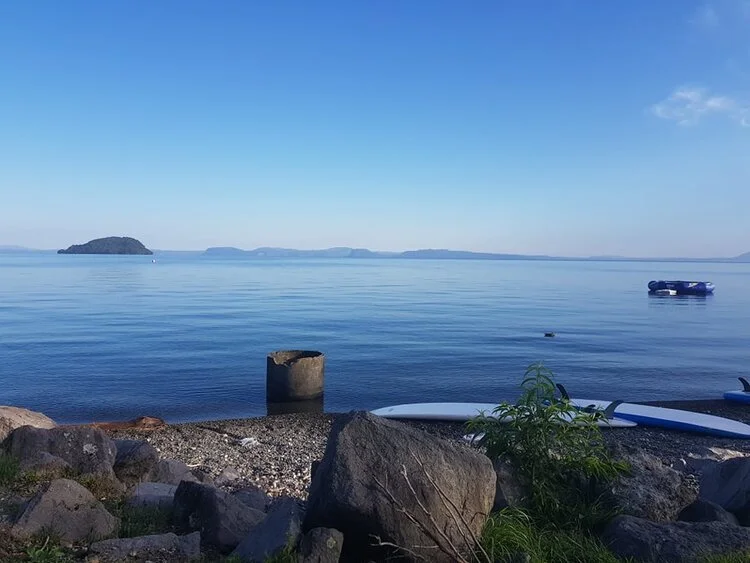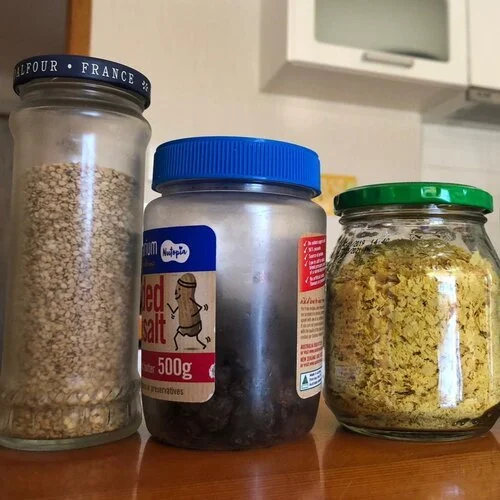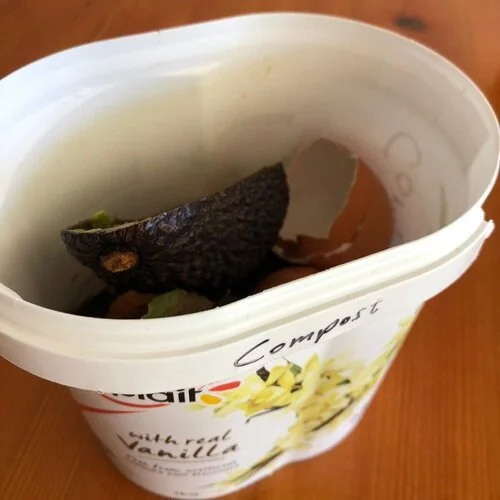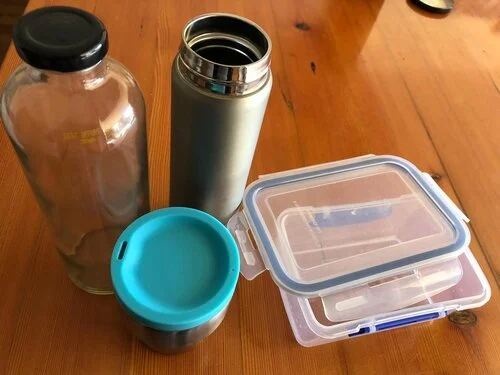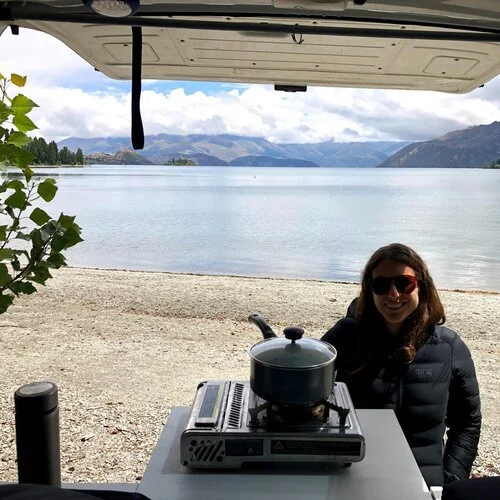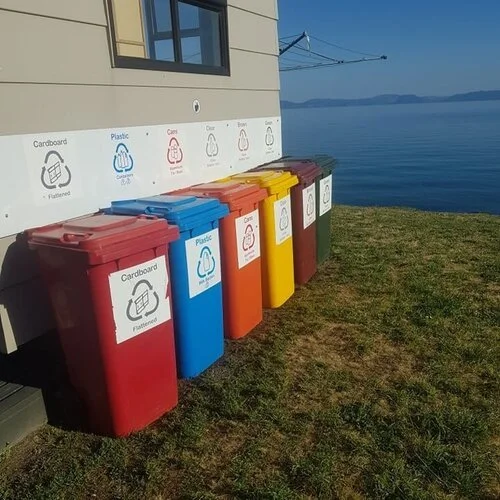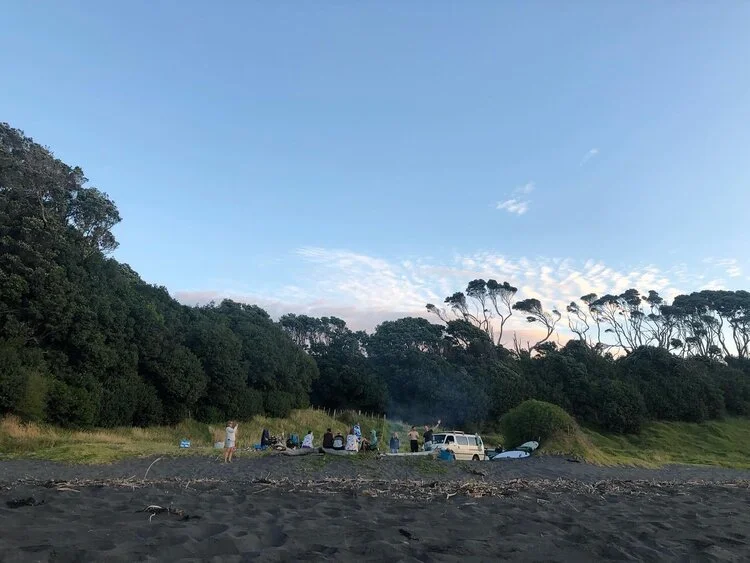Low-waste camping for the summer
Summer is the best time of the year to get out and about on adventures, explore new places and spend some time relaxing, recharging and enjoying nature. If you’re travelling by car, van or motorhome, camping, hitch-hiking or renting a bach, there are really no barriers to continue to engage in our low-waste home habits.
Brittany’s camping spot this summer at Lake Taupo
Here are some of our top tips for low-waste, sustainable and happy camping
1. Reuse, reuse, reuse
How good is buying a container that you can use multiple times AND that comes full of food already? That’s how we feel about our favourite single-use reusables. Your nuts come in a ziplock bag, your jam comes in a jar and your yoghurt in these awesome big containers. Keep them and continue using them! There’s no need to spend extra money on containers or bags at all.
2. Buy in bulk
Get your seeds, nuts, raisins, rice, quinoa and even your cereal in bulk and store them in your single-use reusables to keep them fresh.
Also, consider buying your fruits and vegetables from your local farmers market or if you get them from the supermarket, make sure that you are bringing your reusable bag with you to pack all of your groceries.
3. Compost
This is a hard one when travelling, as not many campsites or public spaces offer composting bins. You can still aim at collecting all of your organic waste in a container until you are able to dispose of it appropriately. Take your own bokashi bin with you. It’s small and compact, and can deal with the majority of your food waste, including meat.
The Compost Collective has an awesome app called Share Waste that allows you to connect with people who accept organic waste otherwise known as “composting space owners”. This is an easy and friendly way to drop-off your compost and also to meet some of the locals!
4. Bring your own
Avoid unnecessary waste by bringing your own cups, containers and cutlery to your camping trips. If your household items are not ideal for camping, you can always head to your favourite op shop and get some camping plates, cutlery and other supplies for a fraction of the price. You can also do this for other camping items such as chairs, chilly bins and more! Almost all camping facilities have running water to wash your dishes so make sure you've also packed your homemade, sustainable dishwashing liquid and sponge. Take these in a sealable container to avoid leaking.
Bring your own cup or container for your takeaway coffees, meals and even your grocery shopping at the supermarket. This is a must.
5. Cook your own meals
Instead of getting takeaways, freeze-dried or packaged meals, pack your own cooking gear and make your own meal! Cook as usual, try sprouting your own beans, lentils or chickpeas in a jar to avoid buying packaged vegetables and greens, dehydrate your meals own at home instead of buying freeze-dried ones for hiking, or make your own roti or flatbread using just flour and water, to avoid buying bread in a plastic bag. The options are endless!
By cooking your own meals you don’t only save money and eat more healthy food, but you also avoid waste produced by takeaway containers and packaging. It’s especially nice if you have a good view, too.
Alex making lunch at Lake Wanaka.
6. Prioritise your waste.
It’s hard to not produce any waste when travelling. So, if you really can’t avoid it, try to keep your waste as “good” as possible. We like to think of an adapted waste hierarchy here: (1) waste that can be reused (like containers, as above), (2) waste that can be easily recycled, like tin, paper/cardboard or glass, (3) waste that is made out of recyclable plastic, and finally (4) avoid! waste that cannot be reused, cannot be recycled and will end up in landfill!
7. Separate your waste and dispose appropriately
It’s great to see more and more camping areas encouraging travellers to separate their waste.
However, this is not always the rule! If you cannot find specific recycling bins closeby, or if they are already overflowing, try to keep your recyclable waste with you for a little longer. There are recycling facilities all around New Zealand, so it’s useful to look for a local recycling facility (Campermate often lists them), or until you arrive back home and are able to sort your waste into your own bins. Keep in mind that all recycling needs to be cleaned beforehand.
8. Leave no trace
What a wonderful place, Aotearoa. Let’s all make sure we play our part in keeping it beautiful, clean and wild by taking all of our rubbish with us when we cannot find a proper place to dispose of it.
Want to share your experiences or ask questions from the Taranaki community? Join our Sustainable Taranaki Community Facebook Group. We’d love to hear from you and learn more about your low-waste journey.
For further reading check out the Rubbish Trip’s Camping/ with less waste or Zero Waste Backpacking.
Written by Alexandra Vernal

